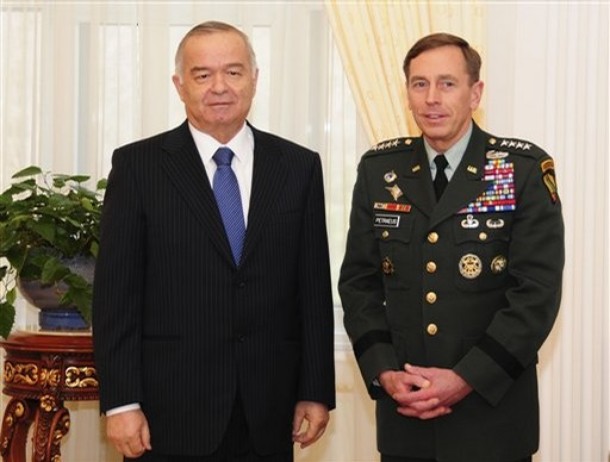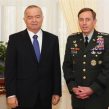
Uzbekistan Playing Renewed Strategic Role in NATO’s Afghanistan Mission
Publication: Eurasia Daily Monitor Volume: 6 Issue: 38
By:

General David Petraeus, Commander of the U.S. Central Command (CENTCOM), held meetings in Tashkent on February 16 and 17 with Uzbek President Islom Karimov and Defense Minister Qobul Berdiyev. Non-military transit routes for the NATO mission in Afghanistan were reportedly on his agenda. The discussions also included issues of regional security and cooperation in the context of stabilizing Afghanistan. Key aspects of Petraeus’s visit point to the possible reemergence of Uzbekistan as a strategically important country in CENTCOM planning (Interfax, February 17).
This was Petraeus’s first visit to Central Asia since the announcement of the closure of the U.S. Manas Airbase in Bishkek. It was significant that he went only to Uzbekistan, raising speculation that his visit might presage negotiations on reopening the airbase at Karshi-Khanabad that was closed in 2005. U.S. Ambassador to Uzbekistan Richard Norland was emphatic, however, that the discussions had not included a possible airbase. According to a spokesperson from the U.S. embassy in Tashkent, Petraeus was in the country to "listen to Uzbekistan’s perspective" on Afghanistan (www.uzreport.com, February 19).
Karimov attached great importance to the meeting with General Petraeus, more so than previous visits to Tashkent by CENTCOM commanders. He told reporters that the meeting was significant, stressing what he described as a "meaningful dialogue" on developing further cooperation between Washington and Tashkent. The meeting at the Oqsaroy presidential residence was another step in the carefully orchestrated efforts to restore bilateral ties that were so badly damaged after the events in Andijan in May 2005 and what the Uzbek leadership considers its subsequent unfair treatment. Throughout this period, the door to reconciliation was kept open by the Uzbeks. General Petraeus’s meeting at such a high level is a signal that the relationship has moved beyond past difficulties. Karimov told Petraeus, "We consider your visit to Uzbekistan as a visit of the first representative of the new administration of the United States, of President Obama, and as the United States’ aspiration to establish closer, mutually beneficial relations with Uzbekistan. Therefore we attach great significance to our talks." It could not be clearer, in the view of the Uzbek leader, that Washington was seeking "close, mutually beneficial relations" with Uzbekistan (Uzbek TV, First Channel, February 17).
Petraeus was also concerned about NATO’s supply lines into Afghanistan and discussed the so-called northern supply route, which would take nonmilitary cargo (building materials, food, medicine, and so forth) overland by rail from Latvia to Afghanistan via Russia, Kazakhstan, and Uzbekistan, with the final part of the journey going across the Tajik-Afghan border. Airis Rikveilis, a spokesman for Latvia’s Ministry of Defense, said on February 18 that shipments leaving Riga were "commercial" and "still in test mode." The Baltic Container Terminal, the starting point for the transit, could see up to 700 20-foot containers shipped each week, generating as much as $15 million annually for the Latvian economy. Estonia’s Foreign Minister Urmas Paet confirmed that Estonia could also send shipments (Moscow Times, February 19; RIA Novosti, February 19).
The first test of the northern route was reportedly being prepared in Riga on February 19 and if successful could involve 20 to 30 trainloads a week. The northern route would be less busy than the existing way through Pakistan but would support CENTCOM’s priority for diversifying the course rather than replacing the Pakistan route ahead of deploying additional forces in Afghanistan. It would also ease the tension that has arisen from Taliban attacks on supply lines going through the Khyber Pass (Moscow Times, February 19). Similarly, Uzbekistan would benefit economically from this new transit route, supporting its own transport companies and the country’s image as a transport hub that might become critical in future efforts to integrate the Afghan economy into the region.
In any case, Uzbekistan will become a key hub for the safe delivery of these supplies. Since Afghanistan lacks a railroad infrastructure, the freight must be taken by road from Termez, Uzbekistan, for the final delivery to its destination in support of the International Security Assistance Force. As it passes through Uzbek territory its security will be ensured by the National Security Service (SNB), which will demand a close liaison with NATO intelligence (AC/46). Thus, Tashkent will provide crucial, but non-military, assistance to the NATO mission in Afghanistan.
Uzbekistan is willing to cooperate with the alliance over the stabilization of Afghanistan by playing a future pivotal role in the northern supply route, sharing intelligence, and stimulating a more regional approach to the Afghan problem. Tashkent, however, has its own security concerns. As it witnesses the apparent failing of the NATO mission, its proximity to Afghanistan engenders deep reservations about the future of the Afghan National Army, which is being trained and equipped by the West and now being offered weapons by Russia. If this effort fails to transform Afghanistan’s security, Tashkent is afraid that a militarized and fractious failed state on its border could spread weapons and militant Islam across Uzbekistan and throughout Central Asia. Uzbekistan is thus a front-line state in the war against terror and is cooperating with the United States and NATO, while seeking reassurances that the NATO mission will ultimately succeed.




